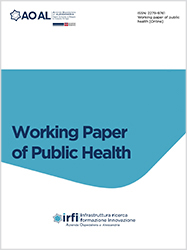Intervento strategico metacognitivo in una popolazione di anziani con declino cognitivo soggettivo
All claims expressed in this article are solely those of the authors and do not necessarily represent those of their affiliated organizations, or those of the publisher, the editors and the reviewers. Any product that may be evaluated in this article or claim that may be made by its manufacturer is not guaranteed or endorsed by the publisher.
Autori
Obiettivi: in questa ricerca, svolta presso l’azienda Ospedaliero-Universitaria di Alessandria, si è svolto un intervento di training strategico metacognitivo al fine di individuare eventuali benefici sulle abilità cognitive, ma anche sul benessere e sulla riduzione di sintomi depressivi in una popolazione di anziani. Materiali e Metodi: il campione era composto da 11 persone, tra dai 66 agli 81 anni, con autovalutazione di declino cognitivo. Essi dovevano imparare strategie di memorizzazione e attraverso il compito metacognitivo riflettere sui processi di apprendimento e applicazione. Il training ha previsto 10 incontri, una volta a settimana. Sono stati misurati i funzionamenti cognitivi pre-test e post-test attraverso la batteria Repeatable Battery for Assessment of Neuropsychological Status (RBANS) e utilizzato prove ad hoc per indagare gli effetti pratica e generalizzazione. Sono stati misurati prima e dopo l’intervento anche il benessere, attraverso il questionario Psychological Well-being Questionnaire (BEN-SSC), e lo stato depressivo con short form Geriatric Depression Scale (sfGDS) a 15 items. Risultati: dai risultati ottenuti sulle misurazioni cognitive non emergono valori significativi se non una tendenza alla significatività per l’indice abilità visuo-spaziale e linguaggio dell’RBANS, che mostrano un leggero miglioramento. Relativamente al benessere e all’umore anche qui non emergono risultati a favore della significatività. Unico dato significativo è la riduzione della soddisfazione personale al BEN-SSC. Conclusioni: ciò che potrebbe giustificare i risultati ottenuti sono alcune inadeguatezze nella metodologia in cui l’alta richiesta cognitiva del training può essere entrata in conflitto con le caratteristiche del campione.
Come citare

Questo volume è pubblicato con la licenza Creative Commons Attribuzione - Non commerciale 4.0 Internazionale.






